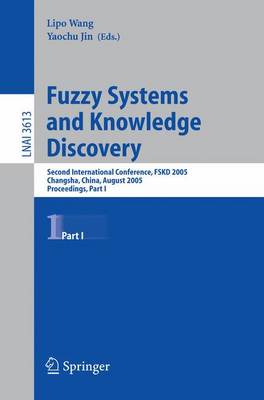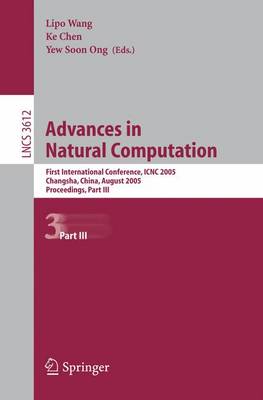Lecture Notes in Computer Science
2 primary works
Book 3613
This book and its sister volume, LNAI 3613 and 3614, constitute the proce- ings of the Second International Conference on Fuzzy Systems and Knowledge Discovery (FSKD 2005), jointly held with the First International Conference on Natural Computation (ICNC 2005, LNCS 3610, 3611, and 3612) from - gust 27-29, 2005 in Changsha, Hunan, China. FSKD 2005 successfully attracted 1249 submissions from 32 countries/regions (the joint ICNC-FSKD 2005 received 3136 submissions). After rigorous reviews, 333 high-quality papers, i. e. , 206 long papers and 127 short papers, were included in the FSKD 2005 proceedings, r- resenting an acceptance rate of 26. 7%. The ICNC-FSKD 2005 conference featured the most up-to-date research - sults in computational algorithms inspired from nature, including biological, e- logical, and physical systems. It is an exciting and emerging interdisciplinary area in which a wide range of techniques and methods are being studied for dealing with large, complex, and dynamic problems. The joint conferences also promoted cross-fertilization over these exciting and yet closely-related areas, which had a signi?cant impact on the advancement of these important technologies. Speci?c areas included computation with words, fuzzy computation, granular com- tation, neural computation, quantum computation, evolutionary computation, DNA computation, chemical computation, information processing in cells and tissues, molecular computation, arti?cial life, swarm intelligence, ants colony, arti?cial immune systems, etc. , with innovative applications to knowledge d- covery, ?nance, operations research, and more.
Book 4222
The three-volume set "LNCS 3610, LNCS 3611, and LNCS 3612" constitutes the refereed proceedings of the First International Conference on Natural Computation, ICNC 2005, held in Changsha, China, in August 2005 jointly with the Second International Conference on Fuzzy Systems and Knowledge Discovery FSKD 2005 (LNAI volumes 3613 and 3614). The program committee selected 313 carefully revised full papers and 189 short papers for presentation in three volumes from 1887 submissions. The first volume includes all the contributions related to learning algorithms and architectures in neural networks, neurodynamics, statistical neural network models and support vector machines, and other topics in neural network models; cognitive science, neuroscience informatics, bioinformatics, and bio-medical engineering, and neural network applications as communications and computer networks, expert system and informatics, and financial engineering.
The second volume concentrates on neural network applications such as pattern recognition and diagnostics, robotics and intelligent control, signal processing and multi-media, and other neural network applications; evolutionary learning, artificial immune systems, evolutionary theory, membrane, molecular, DNA computing, and ant colony systems. The third volume deals with evolutionary methodology, quantum computing, swarm intelligence and intelligent agents; natural computation applications as bioinformatics and bio-medical engineering, robotics and intelligent control, and other applications of natural computation; hardware implementations of natural computation, and fuzzy neural systems as well as soft computing.
The second volume concentrates on neural network applications such as pattern recognition and diagnostics, robotics and intelligent control, signal processing and multi-media, and other neural network applications; evolutionary learning, artificial immune systems, evolutionary theory, membrane, molecular, DNA computing, and ant colony systems. The third volume deals with evolutionary methodology, quantum computing, swarm intelligence and intelligent agents; natural computation applications as bioinformatics and bio-medical engineering, robotics and intelligent control, and other applications of natural computation; hardware implementations of natural computation, and fuzzy neural systems as well as soft computing.

